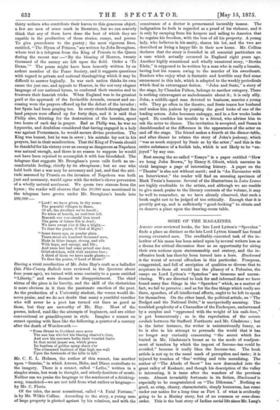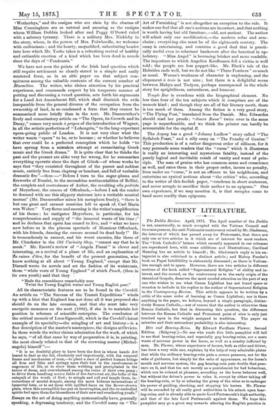SOME OF THE MAGAZINES.
AMONG over-reviewed books, the late Lord Lytton's "Speeches" finds a place as distinct as the late Lord Lytton himself has found among overrated men. The creditably-executed task of the in- heritor of his name has been seized upon by several writers less as a theme for critical discussion than as an opportunity for airing their own notions upon statesmanship and oratory, and the in- offensive book has thereby been turned into a bore. Blackwood is the worst of several offenders in this particular. Pompons, exaggerated, and full of ascription of qualities so diverse that to acquiesce in them all would tax the pliancy of a Polonius, the essays on Lord Lytton's " Speeches " are tiresome and uncon- vincing. We are directed to look for and informed that we have found many fine things in the " Speeches " which, as a matter of fact, we fail to perceive ; and as for the fine things which really are there, speeches, of all intellectual efforts, ought to be left to speak for themselves. On the other hand, the political article, on "The Budget and the National Debt," is unexpectedly amusing. The troubled perplexity of a Chancellor of the Exchequer, embarrassed by a surplus and "oppressed with the weight of his cash-box," is put humourously ; so is. the reprobation of the entente cordiale between Sir Stafford Northcote and Mr. Gladstone ; but in the latter instance, the writer is unintentionally funny, as he is also in his attempt to persuade the world that it has no longer any curiosity concerning "the secret which lies buried in Mr. Gladstone's breast as to the mode of readjust- ment of taxation by which the impost of Income-tax could be avoided," because it really likes the Income-tax. The book article is not up to the usual mark of perception and taste ; it is injured by touches of 'fine' writing and trite moralising. The author of "The Abode of Snow" has now descended into the great valley of Kashmir, and though his description of the valley is interesting, it is tame after the wonders of the previous route. Almost invariably fortunate in its fiction, Blackwood is especially to be congratulated on "The Dilemma." Nothing so good, so crisp, cheery, characteristic, simply humorous, has come under our notice for a long time as Part L of what is evidently going to be a Mutiny story, but of no common or over-done order. This is the best story of Indian social life since Mr. Lang's
' Wetherbys," and the ensigns who are slain by the charms of Miss Cunningham are as natural and amusing as the ensigns whom William Dobbin looked after and Peggy O'Dowd ruled with a salutary tyranny. There is a military Mrs. Nickleby in the story, whom, in the person of Mrs. Polwheedle, we welcome with enthusiasm ; and the hearty, unqualified, unhesitating header into love which Mr. Yorke takes is a refreshing revival of healthy and estimable emotion of a kind which has been dead in novels since the days of "Pendennis."
We have not seen the points of the Irish land question which still require settlement so clearly stated in a simple and easily mastered form, as in an able paper on that subject con- spicuous among the valuable contents of the current number of Macmillan. The writer, who claims attention by his practical experience, and commands respect by his temperate manner of putting and discussing a vexed question, sets forth his arguments for a Land Act Amendment Bill, which shall diminish the evils inseparable from the general divorce of the occupation from the ownership of land, in so condensed a form that they cannot be summarised more briefly than in the text. Mr. Dannreuther's lively and comminatory article on "The Opera, its Growth and its Decay," comes very much apropos of the introduction of Wagner, in all the artistic perfection of " Lohengrin," to the long-expectant opera-going public of London. It is not very clear what the writer wants "opera" to be, or to become ; or whether he believes that ever could be a perfected conception which he holds "to have sprung from a mistaken attempt at resuscitating Greek music and the Greek drama:" It is quite clear that he thinks the past and the present are alike very far wrong, for he summarises everything operatic since the days of Gliick—of whose works he says that "they consisted throughout of the purest and noblest music, entirely free from claptrap or bombast, and full of veritable dramatic fire"—thus :—" Before I turn to the sugar-plums and fireworks of Rossini, to the moonshine sentimentalities of Bellini, the couplets and contredanses of Auber, the revolting olla podrida of Meyerbeer, the cancan of Offenbach,—before I ask the reader to descend with me this slippery staircase into a veritable musical morass" (Mr. Dannreuther mixes his metaphors freely), "there is but one great and earnest musician left to speak of, Carl Maria von Weber." Very fierce and amusing is the writer's amplification of his theme ; be castigates Meyerbeer, in particular, for his comprehension and supply of "the immoral wants of his time ;" and he declares that opera has ceased to live, and "what we have now before us is the piteous spectacle of Monsieur Offenbach, with his friends, dancing the cancan around its dead body !" He is tremendously in earnest, and his worst enemies, like those of Mr. Chuckster in the Old Curiosity Shop, "cannot say that be is meek." Mr. Escott's review of "Angela Pisani" is clever and interesting, as a revival of a phase of life, and an explanation of its raison d'être, for the benefit of the present generation, who know nothing at all about "Young England," except that Mr. Disraeli wrote its novels and set the fashion of its waistcoats, those "white vests of Young England" of which Punch, (then in its own youth) said that they
"Made the resemblance remarkably near 'Twixt the Young English waiter and Young English peer."
All its characteristic features are to be found in the Cornhill. An article on "The Success of the Transit Expeditions" winds up with a hint that England has not done all it was proposed she should do on the late occasion, and that she must take very energetic measures on the next (1882), if she is to maintain her position in schemes of scientific enterprise. The conclusion of the critical memoir of Luca Signorelli, which is the Cornhill's latest example of its speciality—the mingling of art and history—is a fine description of the master's masterpiece, the designs at Orvieto. In these words the writer claims admiration for the work, of which he says, "of all that came by way of preparation it is, in painting, the most closely related to that of the crowning master (Michel- angelo) himself ":— " It is no doubtful glory to have been the first in Whose hands Art learnt to deal as she list, absolutely and imperiously, with the corporal frame and mechanism of man,—to plant a race of perfect human beings all firm and lithe and springy upon their feet in the carelessness or eagerness of life, or to show them writhing and precipitated in the terror of doom, and overwhelmed among the ruins of their own pomp ; to drive them headlong across fields of fire-furrowed air, the bolts of the catapult of the wrath of God ; to mingle and coil and tangle them, in- carnations of mortal despair, among the more hideous incarnations of immortal hate, or to set them with uplifted faces on the flower-strewn plain, when this corruptible has put on incorruption and the re-embodied spirits feel upon them the blessedness of their new and everlasting youth."
Essays on the art of doing anything systematically have, generally speaking, a depressing tendency, and the Cornhill essay on "The Art of Furnishing" is not altogether an exception to the rule. It makes one feel that all one's notions are incorrect., and that nothing is worth having but old furniture,—old, not ancient. The author will admit only one modification,—the modern sofas and arm- chairs ; everything else must be of the eighteenth century. The essay is entertaining, and contains a good deal that is practi- cally useful even to reluctant hankerers after the heretical in up- holstery. "Miss Angel" is becoming brisker and more readable. The imposture to which Angelica Kanffmann fell a victim is well told ; the people are less puppet-like. Mr. Black's tale of the Hebrides ends well, but we do not like "Three Feathers" so much as usual. Wenna's weakness of character is unpleasing, and the elopement a trois is not nice ; but there is a delightful scene between Mabyn and Trelyon, perhaps unsurpassed in the whole story for sprightliness, naturalness, and humour.
Temple Bar is overdone with the biographical element. No less than four of the ten subjects which it comprises are of the memoir kind ; and though they are all of fair literary merit, there is too much of them. Among the fiction is a very good story, "The Flying Post," translated from the Danish. Mrs. Edwardes should read her proofs ; "diners Busse" twice over in the same page is unpardonable, and we think the printer can hardly be accountable for the capital R.
The Argosy has a good "Johnny Ludlow" story called "The Syllabub Feast," and a silly essay on "The Penalty of Genius." This production is of a rather dangerous order of silliness, for it may persuade some readers that the "curse" which it illustrates is really an interesting and mysterious fatality, instead of the purely logical and inevitable result of vanity and want of prin- ciple. The man of genius who has common-sense and conscience as well, and rates them in their proper order, incurs no penalty, lives under no "curse," is not an offence to his neighbours, and entertains no cynical notions about "the critics" who, according to the writer of this foolish paper, "condemn in short sentences, and never scruple to sacrifice their author to an epigram." Our own experience, if we may mention it, is that scruples come to hand more readily than epigrams.



































 Previous page
Previous page